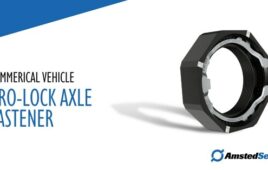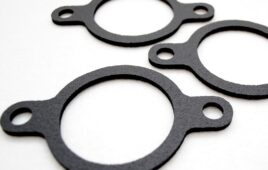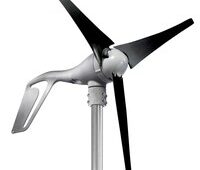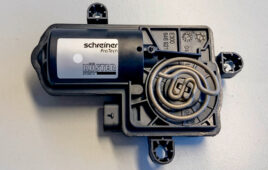 A fleet of zero-emission buses in Oakland, Calif., have reached a major operational milestone thanks in large measure to fuel cell technology supplied by Freudenberg-NOK Sealing Technologies. The company runs the business operations for global sealing expert Freudenberg Sealing Technologies in the Americas.
A fleet of zero-emission buses in Oakland, Calif., have reached a major operational milestone thanks in large measure to fuel cell technology supplied by Freudenberg-NOK Sealing Technologies. The company runs the business operations for global sealing expert Freudenberg Sealing Technologies in the Americas.
Thirteen zero emission fuel cell electric buses equipped with fuel cell systems in the northern California community surpassed more than 20,000 hours of continuous operation last year and one bus surpassed more than 25,000 hours, according to an evaluation being conducted by the U.S. federal government. With two fuel cell power stacks per coach, Freudenberg has supplied more than 800 cell seals and manifold gaskets on each of these ultra-clean vehicles to keep them running. The seals and gaskets are molded from a company-proprietary, ethylene propylene diene rubber (EPDM) and have helped the buses achieve excellent working durability by protecting the fuel cells from environmental contaminates.
Freudenberg’s work on the fuel cell bus project began in 2005 as a result of a joint U.S. Department of Energy–Federal Transit Authority program established to promote the use of fuel cell electric buses to replace CO2-emitting diesel models. Freudenberg-NOK joined forces with a major Tier One systems supplier to develop and provide sealing for the fuel cell stacks being proposed in the project.
Since that time, the company has continued to develop state-of-the-art fuel cell sealing solutions that meet the needs of major system manufacturers.
“The bus fleet project results are significant because they demonstrate an early involvement and investment in understanding the sealing requirements for fuel cell systems where issues like leakage cannot be tolerated,” said Paul Hailey, SVP and Head of the Gaskets Division of Freudenberg Sealing Technologies.
“These fuel cell seals and gaskets greatly exceed program expectations. We carry these successes and learnings forward for use in future development activities,” Hailey said. “Our expertise enables us to evaluate market needs to offer the right materials, designs and innovations and to set a benchmark for future growth.”
In 2016, Freudenberg installed new equipment to produce fuel cell gasket-on-plate components that integrate an elastomer seal onto a stainless steel bipolar plate. The customer, a fuel cell manufacturer, combines this component with electrolytic membranes and gas diffusion layers into an assembled fuel cell stack that powers fork lifts and tow tractors.
This year, the company will industrialize gaskets molded onto gas diffusion layers. This activity marks an important next step in fuel cell gasket innovation.
Fuel cells are electrochemical cells that convert chemical energy from a hydrogen fuel and oxygen into electricity. Because an individual fuel cell produces a relatively small voltage, they are stacked—often in the hundreds with gaskets incorporated into each layer—to produce sufficient voltage to power vehicles and other energy systems.
Fuel cell stacks are compressed and the gaskets hermetically seal the cells, preventing gas leaks, loss of power and cross contamination between the different sides of the assembly. The thickness of the seal’s bead also helps prevent the fuel cells components from shifting when they are compressed into a stack.
Because fuel cell designs vary, Freudenberg uses advanced data analysis and design tools to develop and manufacture sealing solutions that are unique to each fuel cell system. Material selection also varies, depending upon the specific environmental and performance standards the system must achieve.
Freudenberg-NOK Sealing Technologies
fnst.com




